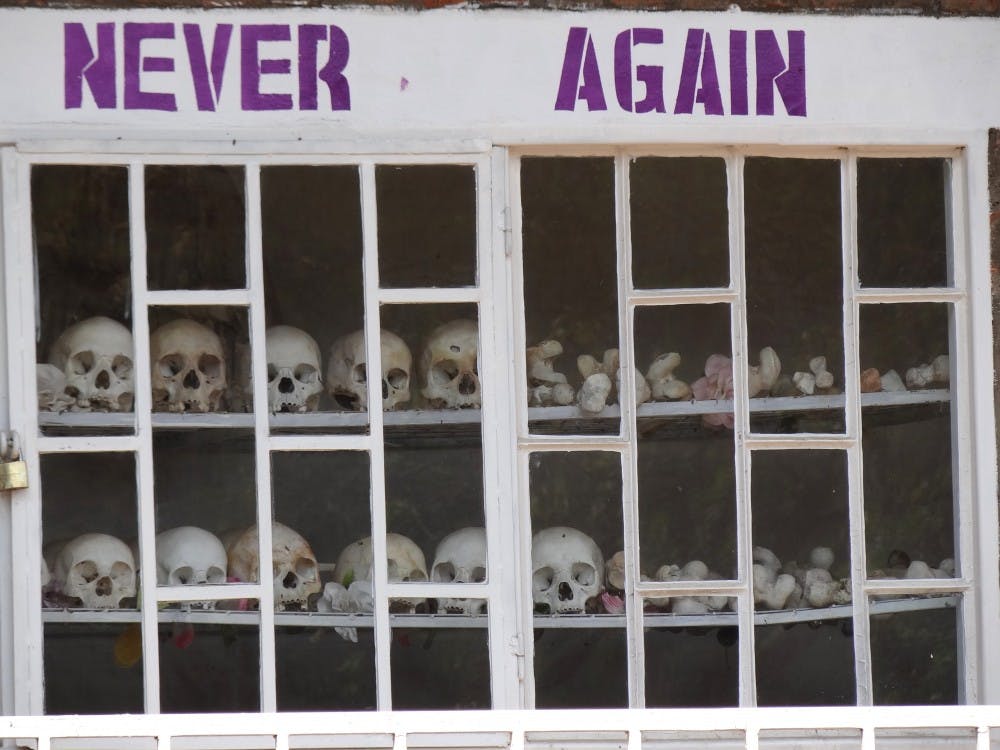Professor Richard Rechtman, the director of studies at École des Hautes Études en Sciences Sociales, gave a talk on Tuesday as part of the Department of Anthropology’s Colloquium Series. In his talk titled “The Ordinary Life of Genocidal Mass Murderers,” Rechtman, an anthropologist and psychiatrist, discussed behavior during periods of genocide.
Rechtman referenced the Rwandan genocide in 1994, in which an estimated 800,000 members of the minority Tutsi community were killed by Hutu extremists, highlighting the way that murder became part of people’s daily routines.
“How does one eat when the main task of the day is making people die?” he said. “Killing and raping may become normal activities — a part of daily life.”
He explained that during such parts of history, mass murder would begin to seem like a mundane part of people’s lives.
“The same qualities are required to make sure that business runs well and to make sure that execution goes smoothly. That is what the ordinary life of the executioner is all about,” he said. “The difference is that death is the central part… Killing, raping, lying are normal activities.”
Rechtman proceeded to delve into the psychology of people who kill their friends and neighbors. He emphasized that because people already knew the habits of their future victims, the act of killing became easier. What changed, however, was that the executioners stopped allowing themselves to feel familiarity with the people they killed.
According to Rechtman, this familiarity ceased to exist when the killers and their deceased victims no longer had anything left in common because they no longer shared the same form of life. He explained that during mass genocides, all the links that once existed between people who lived in such close proximity to each other were eradicated by necessity.
“People did not hesitate to kill [those] whom they had recently considered their kin,” he said. “People had never killed before, never received any practical training. Most of the perpetrators were themselves surprised at the number of victims they had personally killed and disposed of.”
Rechtman added that while the act of killing itself felt unproblematic to the murderers, it was the lingering reminders of the act after it happened that affected them on a deeper level.
“The permanent presence of human residue is far more ominous,” he said. “The smell of blood and gunpowder never went away, and even when at physical remove from the killing, the cries of the victim barely covered the deafening sound of the gunfire, the dirty clothes no longer could even be washed, because of all the crusted mud… and the fragments of human remains.”
Assistant Anthropology Professor Tom Özden-Schilling, a co-organizer of the Colloquium Series, was particularly struck by a postcard that Rechtman read.
The postcard, Özden-Schilling explained, was written by someone who worked next to a concentration camp during World War II and illustrated the way people who were around genocide seem to view violent death as a norm.
“From one sentence to the next, he was jumping from talking about where the post office is to where they execute Jews to addressing his lover by some pet name,” Özden-Schilling said. “It illustrated [Rechtman’s] point because it came from the space of a single letter.”
Özden-Schilling appreciated that Rechtman’s ideas inspired conversations that are still continuing.
“It was really compelling. He gave us a lot to engage with because he gave us a very elegant, well-formulated theoretical premise, and he was quite open to critique,” Özden-Schilling said. “So people had a lot of thoughts about how applicable these different examples were to one another.”
According to Özden-Schilling, Rechtman’s talk was both sophisticated and accessible, which he explained was difficult to achieve within academia.
He added that the Department of Anthropology has recently been striving to encourage a broader range of people to participate in events like this.
“There is this new class, Contemporary Anthropology, that is designed to get undergraduates to come to the colloquia week after week,” Özden-Schilling said. “We see it as a semester-long conversation on what it means to present academic works in progress, stimulating more conversations between undergraduates and their professors.”
Junior Javier Jurado, who is currently taking Contemporary Anthropology, appreciated Rechtman’s passion for the subject matter.
“The title of his colloquium gave me chills,” Jurado said. “Rechtman elaborated quite eloquently on the daily lives of executioners, explaining that executioners do not enjoy death or taking a person’s life away but rather only want to do a job.”





